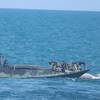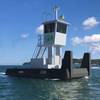IMO Secretary-General Efthimios E. Mitropoulos has welcomed the major effort made by Governments and the shipping and port industries to improve maritime security in the weeks and months leading up to the entry into force of the ISPS Code and related security measures today, 1 July 2004.
Mr Mitropoulos said that, all over the world, a huge amount of work has been undertaken in the period leading up to the entry-into-force date to ensure the highest possible level of compliance. Figures given to IMO by Member Governments indicate that more than 86% of ships and 69% of port facilities had their security plans approved by 1 July 2004 and the figures are rising rapidly. Mr Mitropoulos said, "I think we now have to look on the positive side and remember that the prime objective of this work has been to increase awareness of the real and present threat of terrorism, explain the implications of the ISPS Code and how best to implement it and, in so doing, raise the shipping industry's defences to protect it and seaborne trade from any act of terrorism. There is no doubt that that has been done, the defences are significantly higher than they were before, and we must now ensure that they continue to rise. While I appreciate the efforts made worldwide to achieve the set of objectives, I also acknowledge with appreciation the tremendous work done by the IMO Secretariat, both at the legislatory level and at the technical assistance and co-operation one, to contribute to today's results and the establishment of an adequate maritime security infrastructure to keep terrorism at bay. Their commitment and dedication are most commendable"
Mr Mitropoulos acknowledged that there had been administrative bottlenecks in the run up to the entry into force date and that, without them, the reported 56% of International Ship Security Certificates (ISSC) issued by today would have been higher. "But," he added, "important though certification undoubtedly it is, what really counts is the work that has been done on the ground: security officers appointed on ships, in companies and port facilities, training undertaken, security plans drawn up, awareness raised, and vigilance heightened."
Mr. Mitropoulos said that, from the outset, even before the SOLAS amendments and the Code were adopted, the SOLAS Contracting Governments and the shipping and port industries knew very well that they were to face a very challenging task; that there would be a need for prompt action, within a very limited time, by all parties concerned. He said that, during the last few months, the SOLAS Contracting Governments and the industry, in view of the importance of meeting the challenges posed by the new security measures, had intensified their efforts to comply with the requirements.
At the same time, Mr Mitropoulos was eager to stress the importance of achieving a proper balance between the need for a robust international security regime and the need to ensure the continued flow of global trade. He expressed the hope that whatever disruptions might ensue would be kept to a minimum, calling for a pragmatic approach following the entry into force of the new measures.
He also spoke of the need for security to remain a high priority throughout the industry, even after the additional impetus given by the entry-into-force had diminished. He said, "Throughout the implementation period, IMO has repeatedly urged Governments and the industry to take steps to increase awareness of the potential dangers and to encourage ships' crews to be vigilant and alert to any security threat they may encounter. Great emphasis has been placed on the entry-into-force date, but the real challenge is to ensure that, now that date has passed, we do not allow ourselves to relax and adopt any complacent attitude."
Mr Mitropoulos acknowledged that there was a likelihood of teething problems in the early days of the new international maritime security regime and he pledged that IMO would do whatever it could to assist the smooth implementation of the new measures and the provision, through the Organization's technical assistance programme, of any advisory and other services required to assist Governments to establish the required infrastructure. "It will only be some time after 1 July 2004 that we will be able to establish clearly what the actual situation is and then, if necessary, start taking appropriate action. It is our intention to monitor developments closely during the initial period of implementation so that any appropriate action, including technical assistance for those Governments that need and request it, can be taken."
Featured videos

Inmarsat Enhances Service to Drive Digitalization

Tracking Foreign Vessels Working in the U.S. Jones Act Market

Inside the Electrified Truckable Tug
Subscribe for
Maritime Reporter E-News
Maritime Reporter E-News is the maritime industry's largest circulation and most authoritative ENews Service, delivered to your Email five times per week








